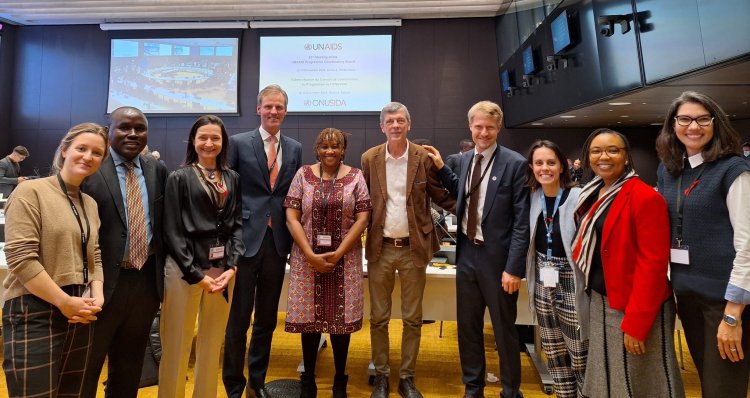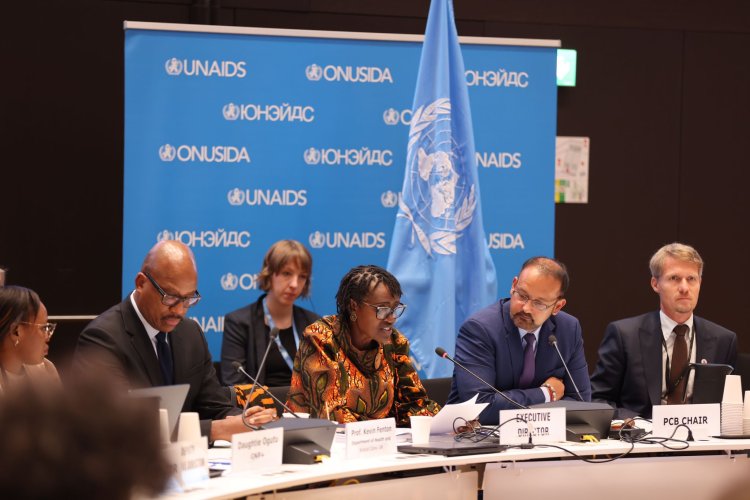Kenya Elected To Lead Joint United Nations Programme
The country clinched the top post on Friday, December 15 during the 53rd UNAIDS programme Coordinating Board held in Geneva, Switzerland.

Kenya has been elected to the United Nations Programme on HIV/AIDS as the Chair of the Joint United Nations Programme on HIV/AIDS for the year 2024.
The country clinched the top post on Friday, December 15 during the 53rd UNAIDS programme Coordinating Board held in Geneva, Switzerland.
Health Cabinet Secretary (CS) Susan Nakhumicha announced in a statement that the position will put Kenya in pole position both locally and internationally owing to its ability to respond to HIV/AIDS cases.
“Kenya has been elected as the Chair of the Joint United Nations Programme on HIV/AIDS during the 53rd UNAIDS programme Coordinating Board held in Geneva, Switzerland for the year 2024,” Nakhumicha stated.

Health CS Susan Nakhumicha during a past Cabinet meeting. /PCS
The Health CS further observed that social and structural barriers continue to increase the vulnerability of HIV infections amongst the population, particularly affecting adolescent girls and young women.
"We must, therefore, put deliberate prevention efforts by improving our understanding of factors that are a cause and driver of AIDS in our communities for us to achieve the collective goal to end AIDS by 2030.
"As we embrace the responsibility to drive this impactful change, we will intensify prevention efforts, expand access to treatment, activate awareness and sensitization campaigns as well as champion inclusively as we focus on building a future where HIV/AIDs is not a threat to our communities," she added.
Nakhumicha however did not attend the UNAIDS Programme Coordinating Board summit on behalf of Kenya. Nonetheless, she was represented by National Syndemic Diseases Control Council (NSDCC) CEO Ruth Laibon Masha, who is currently the Chief Executive Officer at the National Syndemic Diseases Control Council (NSDCC) formerly recognized as the National AIDS Control Council in Kenya.
Kenya's new role as the the chair of the United Nations Programme on HIV/AIDS will see it lead the Programme Coordinating Board (PCB) which acts as the governing body on all programmatic issues concerning policy, strategy, finance, monitoring and evaluation of UNAIDS.
The PCB is composed of 22 Member States, elected from among the Member States of the Cosponsoring Organisations, with seats distributed across various regions.
Furthermore, the Chair is mandated to preside over meetings, act as a neutral moderator of the Board and facilitate balanced representation of views in the debates.
UNAIDS is a model for United Nations reform and is the only cosponsored Joint Programme in the United Nations system. It draws on the experience and expertise of 11 United Nations system Cosponsors and is the only United Nations entity with civil society represented in its governing body.
The cosponsors include UNHCR, UNICEF, WFP, UNDP, UNFPA, UNODC, UN Women, ILO, UNESCO, WHO and the World Bank.
UNAIDS has helped to position, shape and scale up the response to HIV like no other organization, encouraging dialogue and bringing in communities that have been left out of decision-making.
"Without UNAIDS, the human rights of people living with HIV would have been held back and the voice of civil society would be heard far less often.
"UNAIDS has transformed policy. UNAIDS has shaped public policy on HIV at the global, regional and national levels. It has mobilized investment for sound national policy using evidence, experience and political advocacy, built health and community systems, established legal frameworks and shaped public opinion towards creating healthy and resilient societies," the organization states on its website.


 admin
admin 




